上海牛津英语八年级上册
Unit+2+Listening+课件++2023-2024学年牛津上海版(试用本)八年级英语上册+
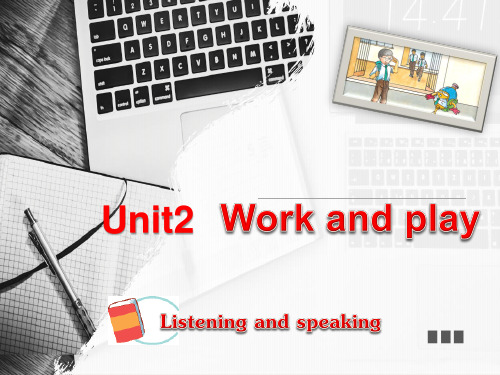
When we talk about our daily routines, we usually talk about two things:
When you listen to a daily rountine, you should pay attention to those two things and take notes.
Do you understand? Can you repeat that? Is it correct? Can you explain it?
We also make our voices rise to show politeness.
Excuse me.
You’ll have to hurry. Thank you.
Now, think about your daily routine. Do you like your daily routine? If not, do you want to change it?
Sandy's daily routine
On weekdays I have to wake up a bit
Excuse me is a polite way of getting a person’s attention and letting him/her know that you want to start speaking.
• Practise reading the conversation below.
What? visit ______________ __________________
When? __________________ __________________
牛津上海版英语八年级上册《Unit6Nobodywins(I)》说课稿8

牛津上海版英语八年级上册《Unit 6 Nobody wins (I)》说课稿8一. 教材分析《牛津上海版英语八年级上册》Unit 6 “Nobody wins (I)” 以自行车比赛为背景,让学生在真实情境中学习英语。
通过观察、体验、交流和合作,学生可以提高自己的语言能力,学会如何表达自己的观点和情感。
本单元主要让学生掌握一般现在时态和一般过去时态的被动语态,以及相关词汇和短语。
二. 学情分析八年级的学生已经掌握了基本的英语语法和词汇,具备一定的听说读写能力。
但是,学生在使用英语进行交流时,仍存在一定的困难,尤其是在表达自己的观点和情感方面。
此外,学生对于一般现在时态和一般过去时态的被动语态掌握不够熟练,需要通过本节课的教学来进一步巩固。
三. 说教学目标1.知识目标:学生能够掌握一般现在时态和一般过去时态的被动语态,以及相关词汇和短语。
2.能力目标:学生能够在真实情境中运用英语进行交流,表达自己的观点和情感。
3.情感目标:学生能够学会尊重他人,关爱环境,培养团队合作精神。
四. 说教学重难点1.教学重点:一般现在时态和一般过去时态的被动语态的运用。
2.教学难点:如何让学生在真实情境中运用英语进行交流,表达自己的观点和情感。
五. 说教学方法与手段1.教学方法:采用情境教学法、交际教学法和任务型教学法,让学生在真实情境中学习英语,提高学生的语言运用能力。
2.教学手段:利用多媒体课件、图片、视频等辅助教学,激发学生的学习兴趣,提高学生的学习积极性。
六. 说教学过程1.导入:通过展示自行车比赛的图片和视频,引导学生谈论自行车比赛,激发学生的学习兴趣。
2.新课呈现:介绍一般现在时态和一般过去时态的被动语态,以及相关词汇和短语。
3.课堂实践:学生分组进行角色扮演,模拟自行车比赛的情景,运用所学的被动语态进行交流。
4.巩固练习:设计相关的练习题,让学生进行听力、阅读和写作训练。
5.课堂小结:总结本节课所学的内容,强调一般现在时态和一般过去时态的被动语态的运用。
牛津上海版英语八年级上册《Unit 5 Encyclopaedias》说课稿3
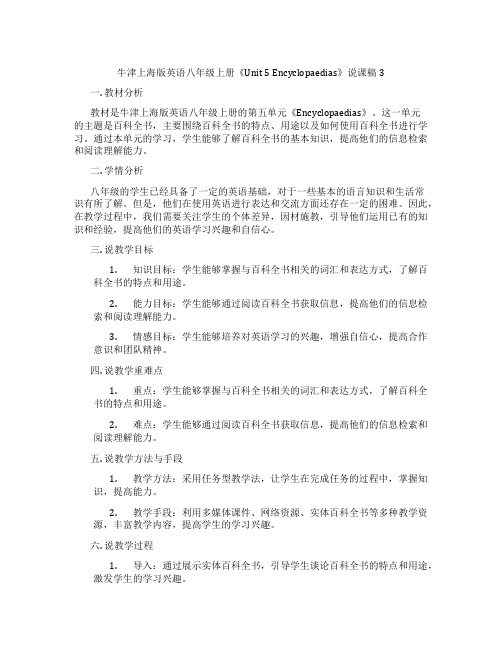
牛津上海版英语八年级上册《Unit 5 Encyclopaedias》说课稿3一. 教材分析教材是牛津上海版英语八年级上册的第五单元《Encyclopaedias》。
这一单元的主题是百科全书,主要围绕百科全书的特点、用途以及如何使用百科全书进行学习。
通过本单元的学习,学生能够了解百科全书的基本知识,提高他们的信息检索和阅读理解能力。
二. 学情分析八年级的学生已经具备了一定的英语基础,对于一些基本的语言知识和生活常识有所了解。
但是,他们在使用英语进行表达和交流方面还存在一定的困难。
因此,在教学过程中,我们需要关注学生的个体差异,因材施教,引导他们运用已有的知识和经验,提高他们的英语学习兴趣和自信心。
三. 说教学目标1.知识目标:学生能够掌握与百科全书相关的词汇和表达方式,了解百科全书的特点和用途。
2.能力目标:学生能够通过阅读百科全书获取信息,提高他们的信息检索和阅读理解能力。
3.情感目标:学生能够培养对英语学习的兴趣,增强自信心,提高合作意识和团队精神。
四. 说教学重难点1.重点:学生能够掌握与百科全书相关的词汇和表达方式,了解百科全书的特点和用途。
2.难点:学生能够通过阅读百科全书获取信息,提高他们的信息检索和阅读理解能力。
五. 说教学方法与手段1.教学方法:采用任务型教学法,让学生在完成任务的过程中,掌握知识,提高能力。
2.教学手段:利用多媒体课件、网络资源、实体百科全书等多种教学资源,丰富教学内容,提高学生的学习兴趣。
六. 说教学过程1.导入:通过展示实体百科全书,引导学生谈论百科全书的特点和用途,激发学生的学习兴趣。
2.新课呈现:教师通过多媒体课件,展示与百科全书相关的词汇和表达方式,引导学生学习和掌握。
3.实践环节:学生分组进行任务,通过阅读实体百科全书,获取相关信息,进行分享和讨论。
4.巩固环节:教师通过提问、游戏等方式,检查学生对知识的掌握程度,及时进行反馈和指导。
5.总结环节:教师引导学生总结本节课的学习内容,强调重点知识。
Unit4+教案 牛津上海版八年级英语上册

牛津上海版英语八年级第一学期unit4教案Material: Oxford English 8A Unit 4 NumbersLesson type:Reading: Numbers: Everyone’s language (1)Class: Class 1 and Class 2, Grade 8Teaching objectives:By the end of the class, the students are expected to1. 通过文本阅读,理解部分核心词汇的含义及用法,知道部分拓展词汇的含义;能够使用恰当的词汇来描述数字这一国际语言;2. 通过阅读活动,获取有关数字的基本信息并归纳文章主旨大意。
Focus on learning:通过文本阅读,理解部分核心词汇的含义及用法,知道部分拓展词汇的含义;能够使用恰当的词汇来描述数字这一国际语言;Potential difficulties in learning:通过阅读活动,获取有关数字的基本信息并归纳文章主旨大意。
Stages Learning activities PurposesLead in 1. What do we call them?2. Think about what these numbers stand for.To set up a situation and predictwhat to read.Pre-reading 1. Read and answer the questions.What is the title?What can we know from the title?What will the write probably talk about in the text?While- reading 1. Read through the subheadings, pictures and thelast paragraph. Answer the questions.What is the passage about?How many parts are there in the passage?2. Read “ancient numbers”. Tell the meanings ofthe pictures.3. Read “zero”. Find the answers to thesequestions.What does this part tell about zero?What is the system of numbers most peopleuse today?Who played an important role in creating the1-9 system?4. Read “calculating machines”. List thecalculating machines and their advantages.5. Read “brain against computer”. Complete thetable.To help students read for thegeneral idea and detailedinformation.Post- reading 1. Read the following questions and think.Which has been answered in the article?Which hasn’t been answered?To help students furtherunderstand the text.Which can be inferred from the article?Are all the answers questions closely related to the title “numbers: everyone’s language’? Explain your reason.AssignmentsCopy the new words and phrases you learnedin today's lesson. Then read them aloud after therecording.Think and answer the second question inTask 3 on your worksheet.Complete Exercises C (CI, C2, C3) and D(DI, D2) on pages 58 and 59, Student's Book.Read the passage aloud after the recordingthree times.To consolidate what is learnt inclass.Material: Oxford English 8A Unit 4 NumbersLesson type:Reading: Numbers: Everyone’s language (2)Class: Class 1 and Class 2, Grade 8Teaching objectives:By the end of the class, the students are expected to1. 通过阅读,了解说明文的文体特征,判断文章说明对象,辨别作者所使用的说明方法;2. 在阅读中,识别段落主题句,判断作者使用的细节支撑类型; 进一步探讨各段落与标题的匹配度,完善主题信息。
期中知识点复习和练习牛津上海版八年级英语上册

2023学年牛津上海试用本八年级英语第一学期期中知识点复习和练习语法复习1.时态练习:1.( )I in London for many years during the war.A. livedB. was livingC. have livedD.am living2. ( )The Harry Potter books ______ pretty popular since they were published.A.becameB. will beeC. have beeD. are being3. ( )A Disneyland Park ______ in Shanghai Pudong New Area in the near future.A.has builtB. will be builtC. will buildD.is built4.( )I heard the weather report on the radio while I __________ to work.A. droveB. has drivenC. am drivingD. was driving5. ( )Recently many young customers______ to give up their old mobile phones and buy thenew Iphone6.A) decide B) have decided C) had decided D) decide6. ( )Simon’s father promised that they________ a cruise trip to Europe the next summer.A)will take B)are taking C) would take D) were taking7. ( )Starbucks (星巴克) _______ as a small coffee shop in a market in Seattle in 1971.A) start B) started C) has started D) had started8. ( )A new school __________ in our town next year.A) will build B) will be built C) is going to build D) is built9. ( )Do you know how they __________the results next time?A) made B) will make C) makes D) make10. ( )Blaine plans to study art in the UK. His friends him off at the airport next week.A) see B)saw C) will see D) would do11. ( )Every year the artist ______ two months living in the mountain and painting.A) has spent B) will spend C) spends D) spent12. ( )Hello Kitty _____ popular around the world since it was created in 1974 by a Japanesepany.A) is B) was C) will be D) has been13. ( )Last night I didn’t answer your phone because I _____ an interesting TV programme.A)was watching B) watched C) had watched D) have watched14.( ) Mary ________ in that housing estate since she came back to Shanghai in 2005.A)is living B) had lived C) would live D) has lived15.( ) Am I late?Don’t worry. Your favourite broadcast _________ yet.A doesn’t startB didn’t startC won’t startD hasn’t started16.( ) Those wounded soldiers _________ in a cave and waited for help.A hideB are hidingC hidD will hide17.( ) _______he ________the driving test?No, not yet.A. Did, passB. Does, passC. Have, passedD. Has, passed18. ( )I from Mr. Black since he moved to Beijing. I’ll visit him when I go there.A. haven’t heardB. won’t hearC. don’t hearD. didn’t hear19. ( )My sister much charity work in her free time when she enters college.A. has doneB. will doC. didD. does20. ( )The librarian told us ________the magazines out of the library.A) don't take B) didn't take C) not take D) not to takeKeys:15 ACBDB 610 CBBBC 1115 CDADD 1620 CDCBD2. 名词修饰词1.修饰不可数名词Little , a little, not much, much,a great deal of2.修饰可数名词Few , a few, not many, many ,a large number of ,the number of3. 修饰可数和不可数no, some, any, a lot of , lots of,plenty of , enough练习:1.( )The magic show lasted for three hours, but ______ people left early.A) few B) a few C) little D) a little2.( )The oneyearold boy is smart and he is able to count up to the ________ number.A) hundred B) hundreds C) hundredth D) hundreds of3.( )People waste __________ electricity every day. It’s time to take action.A) a large number of B) huge amounts of C) many D) quite a lot4.( )Twenty people died and over _________were injured in the accident.A) hundred B) hundred of C) a hundred D) hundreds of5.( )It’s unusual for him to be so active because he is often a boy of ______words.A) few B) little C) many D) much6.( )This summer vocation I am going to do a lot of ___________to prepare for the seniorhigh school.A)job B) work C) invention D) serviceA CBC B3. 情态动词练习:( )1. Plants and flowers __________ water and sun when they start growing.A. need toB. don't needC. needn'tD. need( )2. You have already tried your best, so you ________ worry too much about the exams.A. can'tB. needn'tC. mustn'tD. shouldn't( )3. Only you ________ do such a thing, I'm sure, and nobody else has such an ability.A. mustB. shouldC. mayD. can( )4. You ______ worry about your son. He can take care of himself.A. can’tB. may notC. mustn’tD. needn’t( )5 Mum, will you buy me the new iPad after the High School Entrance Examination?I’m afraid I _______, dear. We ar e short of money now. (A can’t B. mustn’t C shouldn’t D needn’t( )6. It ________ be fantastic if more students join in the charity show tomorrow.A mustB needC canD may( )7. Nowadays even a small personal puter _________ store huge amounts of information.A. mustB. needC. shouldD. can( )8. Every citizen ________ try his best to protect our environment. It’s our duty.A. needB. mustC. canD. may( )9. Must we finish the poster in class?No, you . You can finish it after class.A.Mustn’t B. needn’t C. shouldn’t D. can’t( )10. Christy has been in China for two years, but she still _______ speak Chinese.A. needn'tB. can'tC. mustn'tD. shouldn't( )11. Tom, you mustn't play with fire. You hurt yourself if you don't stop.A. mayB. canC. shouldD. need to( )12. You ______ wash your car at the moment. It’s going to rain.A. needn’tB. mustn’tC. shouldn’tD. can’t( )13. Can you speak louder, please? I ________ hear you clearly.A. mustn'tB. shouldn'tC. needn'tD. can'tkeys:15 DBDDA 610 ADBBB 1113 AAD4. 宾语从句练习:( )1. He didn't tell us ______.A. if he will give us a lecture,B. whether he would go with youC. when would he startD. when he will arrive( )2. E xcuse me, could you please tell us __________?A. how can we get to the airportB. how we can get to the airportC. how could we get to the airportD. how we could get to the airport( )3. Nobody knows ________ player will win the game until the last moment.A. whichB. whenC. howD. where( )4. I didn’t understand __________ in class, so I raised my hand.A what my teacher saidB what did the teacher sayC what does my teacher sayD what my teacher says( )5. A moment, please. I'm checking if Mr. Smith _________ free tomorrow.A. isB. will beC. wasD. has been( )6. The teacher didn't know _______.A. when the school playground opens to the publicB. when will the school playground open to the publicC. when would the school playground open to the publicD. when the school playground would open to the public( )7. My friend told me that he to visit his old grandpa the next week.A. wentB. will goC. would goD. had gone( )8. Nobody has told us ______.A. what will we discuss at today’s meetingB. what we will at today’s meeting discussC. what we will discuss at today’s meetingD. what at today’s meeting will we discuss ( )9. Could you tell me ________ yesterday afternoon?A. when the school sports meeting endedB. when did the school sports meeting endC. when ended the school sports meetingD. when the school sports meeting did end Keys: 15 BBAAB 69 DCCA综合篇Choose the best answer.( )1. Will you connect the wire _________ the vacuum cleaner(真空吸尘器)?A. ofB. intoC. toD. on( )2. My uncle _________ go to work by bus, but now he _________ going to work on foot,A. is used... is used toB. used to... is used toC. is used to... used toD. used to... is used( )3. This kind of mobile phone looks _________ and sells _________.A. nice... goodB. nice... wellC. well... niceD. good... nice ( )4. The government warned some factories _________ the water again, or they will be punished.A. polluteB. to polluteC. not polluteD. not to pollute ( )5. The Eiffel Tower is _________ the symbol of France.A. similar toB. familiar withC. familiar toD. known as ( )6. A: May I join in Jack's birthday party tomorrow evening, Mum?B: Certainly. But you _________ be back before 8 o'clock.A. canB. mayC. mustD. need( )7. She doesn't feel tike taking the traditional Chinese medicine _________ it tastes too bitter.A. thoughB. becauseC. whenD. if( )8. Spring is ing. Why not _________ for a holiday in the countryside?A. goingB. to goC. goesD. go( )9. Tony is a good boy. He never forgets _________ the light before sleeping.A. turning offB. turn offC. to turn offD. turned off ( )10. _________ family is much bigger than__________.A. Our... theirB. Our...theirsC. Theirs...oursD. Theirs... our ( )11. Peter only slept for three hours last night. He got _________ sleep.A. too littleB. too muchC. enoughD. too few( )12. The trees can protect themselves _________ municating _________ each other in their own ways.A. by...withB. in...withC. by... toD. in... to( )13. Jenny's husband has _________ Australia for a week.A. gone toB. been toC. arrived inD. been in( )14. It's our duty to keep our classroom ___________ every day.A. cleaningB. to cleanC. cleanedD. clean( )15. It’s sensible of you to take an umbrella in this changeable weather.A. wiseB. kindC. nineD. goodC B BD A, C B D C B , A A D D A能力提升阅读基础篇II.Choose the words or expressions and plete the passage (选择最恰当的单词或词语完成短文)If you have no mobile phone, no puter, and no Internet with you, what will you do with your free time? Will you go ____1____?Harley, a 15yearold girl from California, US stayed calm. She did something different. Her mobile phone didn’t work one day, so she decided to try and live ____2____ it. She took a sixweek summer travel with some friends.Harley and ten other teenagers rode their bikes 3,000 miles across the States. With two college students as guides, they started from a beach in Georgia on June 23. They travelled through small towns in the south, they ____3____ in the mountains.It’s not easy to find a fortable place to sleep. “It was too hot in the south, and super wet, too.” Harley said. And mosquitoes (蚊子) were around them ____4____ when sleeping outside.Although there were ____5____, no one left the team. “Everyone was hardworking and did everything for the group,” Harley said. “We learned how to live with other people and look after each other.”From these things, they not only ____6____ themselves, but also opened their eyes. “Southern people are really nice,” Harley said. “Small munities were just that. It’s a nice change of what most of us are used to. It’s how the rest of the country lives. It’s a whole new world.”( )1. A. enjoyable B. interesting C. crazy D. busy( )2. A. with B. without C. on D. for( )3. A. set a fire B. watched TV C. had a picnic D. made camps( )4. A. all the time B. for the time being C. from time to time D. in a short time ( )5. A. happiness B. goodness C. worries D. difficulties( )6. A. trained B. taught C. learned D. practicedCBDADAIn kindergarten, your idea of a good friend was the person who let you have the red crayon when all that was left was the ugly black one.In first grade, your idea of a good friend was the person who went to the bathroom with you and held your hand as you walked t____1___ the scary halls.In third grade, your idea of a good friend was the person who shared their lunch with you when you forgot yours on the bus.In fifth grade, your idea of a friend was the person who saved a seat on the b___2____ of the bus for you.In seventh grade, your idea of a friend was the person who did homework and r____3___ lessons with you.In ninth grade your idea of a good friend was the person who changed their s____4___ so you would have someone to sit with at lunch.…As you grow up, your idea about friends may change. G___5____, you will realize that a good friend is the person who gives you the better of the two choices, holds your hand when you’re scared, helps you fight a____6___ those who try to take advantage of you, thinks of you at times when you are not there, r____7___ you of what you have forgotten, stays with you so thatyou have confidence, goes out of their way to make time for you, helps you deal with p____8___ from others, smiles for you when they are sad, helps you bee a better person, and most i____9___, loves you!1. ___________2. ____________3. ___________4. ___________5. ___________6.____________ 7. ___________ 8. ___________ 9. ___________综合篇:A. Choose the best answer (根据内容,选择的答案) ( 12分)Dear Anne,Thanks for your email. It's great to have a pen pal from another country. My name is Jeff. and my family has a farm in Australia. We grow wheat and other crops on our farm. Let me tell you what happened here last week.Until last week. our plants had been growing well because we've had a lot of rain. Then the locusts came. They flew towards our farm in a swarm(一大群). which contained millions of locusts and covered an area of several square kilometers. The locusts came from an area far away. They had flown through the night.Early the next morning. I went outside with Dad We looked at the swarm in the sky. I had never seen so many animals together at a time. Dad said there was nothing we could do for the crops. I wasn't afraid. because locusts don't hurt people.The swarm landed in our fields, and the locusts ate most of our wheat. We lost a lot of our harvest.Then the locusts flew to other farms in our area and ate some of those crops. too.I didn't go to school that day, because the swarm of locusts made it hard for drivers to see on the roads and the school bus didn't run. Instead. I helped Mum and Dad on the farm.The locust plague(宄祸) is over now, and the locusts have all gone. Mum and Dad said we must get the damaged fields ready for the new plants. We are going to be very busy on the farm. Email me again soonYour new friend.Jeff( )69. Jeff’s family runs a _________ in Australia.A) factory B) restaurant C) pany D) farm【参考答案】D【考查内容】细节理解题【思路解析】根据文章第一段的第三句话:My name is Jeff. and my family has a farm in Australia,可知答案。
牛津版上海英语八年级上册 Unit 1 Penfriends 讲义(无答案)
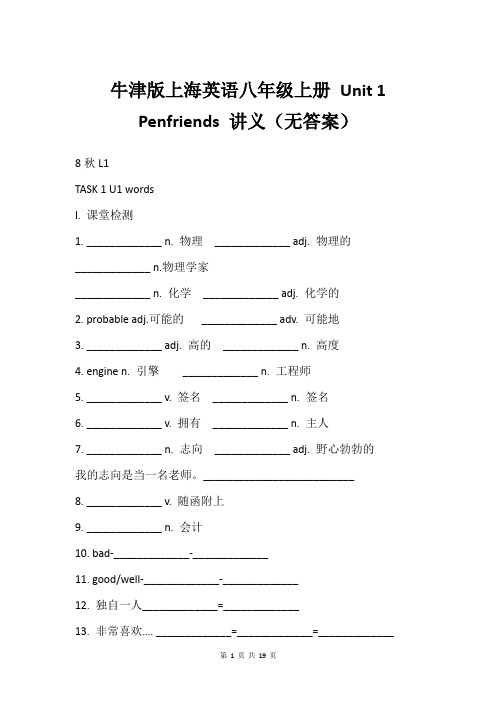
牛津版上海英语八年级上册Unit 1 Penfriends 讲义(无答案)8秋L1TASK 1 U1 wordsI. 课堂检测1. _____________ n. 物理_____________ adj. 物理的_____________ n.物理学家_____________ n. 化学_____________ adj. 化学的2. probable adj.可能的_____________ adv. 可能地3. _____________ adj. 高的_____________ n. 高度4. engine n. 引擎_____________ n. 工程师5. _____________ v. 签名_____________ n. 签名6. _____________ v. 拥有_____________ n. 主人7. _____________ n. 志向_____________ adj. 野心勃勃的我的志向是当一名老师。
__________________________8. _____________ v. 随函附上9. _____________ n. 会计10. bad-_____________-_____________11. good/well-_____________-_____________12. 独自一人_____________=_____________13. 非常喜欢…. _____________=_____________=_____________14. 收到某人的来信_____________=_____________15. 2.5米_____________=_____________16. 在….的末尾_____________17. 最后_____________=_____________=_____________18. 一个叫做John的男孩_____________19. 觉得做某事很…. _____________20. 希望做某事_____________21. 期待做某事_____________22. 擅长做某事_____________=_____________II. Fill in the blanks with the words in their proper forms. (用所给单词适当形式填空)I ____________(sincere) hope you will come to visit Shanghai soon.“This is the ____________(good) gift I have received,” the little boy says. The ____________ (engineer) he invented helped us save a lot of time. Yesterday I met the ____________(own) of the café on my way home. Do you know the difference between ____________(physics) changes and chemical changesMy brother’s ____________(ambitious) is to be a successful designer in the future.We are surprised at the ____________(high) of the mountain. It’s really the highest one in the world.There are ____________(probable) some living things on other planets, but we don’t know yet.PracticeI. Choose the best answer. (选择最恰当的答案)1. My cousin wrote a letter to her penfriend last night and enclosed a photo of________.A. herB. herselfC. sheD. hers2. A policeman’s job is ________make the city safe.A. helpB. to helpC. helpsD. to helping3. ---________ is it from your company to your home---About 30 minutes’ ride in my car.A. How longB. How soonC. How farD. How much4. We are doing much better________ English________ our teacher’s help.A. in , atB. at ,inC. in , withD. with ,with5. Why are you looking at the letter all the time Is there ________on itA. strange anythingB. nothing strangeC. anything strangeD. strange nothing6. In this quiz, we’re asked to write a letter of about________.A.60-wordsB.60-wordC.60 wordsD.60 words’7. A: Look, someone left a novel.B: Oh, yeah. This ________ be Kitty’s. Only she likes to read this kind ofA. canB. mustC. mayD. might8. Don’t give up! You may try________ second time.A. theB. thatC./D. a9. My hobbies are ________ English songs and ________chess.A. listen to, playB. to listen to, to playC. listening to, playingD. listening, to playing10. The view here is really fantastic ________ when it is during summer nights.A. probablyB. exactlyC. especiallyD. mostly11. They will stay in Japan for________.A. two and half monthB. two months and a halfC. two months and halvesD. two and a half month12. You have________ friends at school, do youA. someB. fewC. littleD. many13. During the seven-day National Day holiday, ________families went sightseeing.A. thousandB. thousandsC. thousands and thousandsD. thousands of14.The woman with her children ________under the big tree.A. are singingB. singingC. singD. is singing15. Mike has blonde hair, and he has a parting ________ the middle ofA. onB. inC. atD. over16. Do you remember Miss Wu She taught ________ English at college.A. usB. weC. ourD. ourselves17. I don’t like this blue T-shirt with the red dots. Can you show me ________ oneA. otherB. othersC. anotherD. the other18. The hole is two meters deep. Be careful, ________ you will fall into it.A. soB. orC. andD. but19. Mike enjoys ________ football after class. That’s his favourite outdoor activity.A. playB. playsC. to playD. playing20. Sam is the ________ table tennis player among all students in Grade Eight.A. goodB. wellC. betterD. bestplete the sentences with the given words in their proper forms.(用括号里所给词的适当形式完成下列句子)Your bedroom is much tidier than ____________. (I)I am always the ____________ to get to the classroom in the morning. (one)The ____________ of the houses were destroyed in the fire. (roof)Kitty is ____________ the most talented dancer among all these children.(probable)The mountain is too ____________ for the old to climb up. (height) Finally, Jane ____________ a bakery after great effort. (owner)III. Rewrite the following sentences as required.(根据要求改写下列句子)Cindy has a lot of penfriends worldwide. (改为否定句)Cindy________ ________ ________ penfriends worldwide.They go to work every day by subway. (对划线部分提问)________ ________They go to work every day.He enclosed some photos of his hometown. (改为一般疑问句)________he________ ________ photos of his hometownLinda has been a member of penfriend international since last summer vocation. (对划线部分提问)________ ________has Linda been a member of penfriend international It’s 20 minutes’ walk from my home to the nearest shopping mall. (对划线部分提问)________ ________ Is it from your home to the nearest shopping mall?That boy received a letter from his former desk mate yesterday. (保持句意不变)That boy ________ ________ his former desk mate yesterday.I would like to be a football star. (改为一般疑问句)________ you ________ to be a football starThe children often go to the beach to have a swim. (对划线部分提问)________ ________ the children often go to the beach?enclosed, and, himself, some of, a photo if, his family members, he(连词成句)___________________________________________________________ _.TASK 2 Listening☆Tips: 听录音,记笔记在做听力时运用恰当的方法做笔记,能够帮助同学们获取听力材料的主要信息,从而理解听力材料的大意。
牛津上海版英语八年级第一学期期末作文范文8篇(含答案)
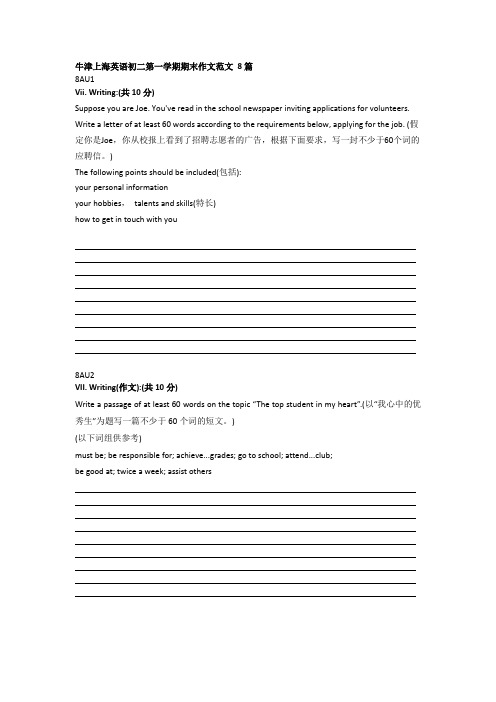
牛津上海英语初二第一学期期末作文范文8篇8AU1Vii. Writing:(共10分)Suppose you are Joe. You've read in the school newspaper inviting applications for volunteers. Write a letter of at least 60 words according to the requirements below, applying for the job. (假定你是Joe,你从校报上看到了招聘志愿者的广告,根据下面要求,写一封不少于60个词的应聘信。
)The following points should be included(包括):your personal informationyour hobbies,talents and skills(特长)how to get in touch with you8AU2VII. Writing(作文):(共10分)Write a passage of at least 60 words on the topic “The top student in my heart”.(以“我心中的优秀生”为题写一篇不少于60个词的短文。
)(以下词组供参考)must be; be responsible for; achieve...grades; go to school; attend...club;be good at; twice a week; assist others8AU3Vii. Writing: (共10分)85. Write a passage of at least 60 words on the topic “On my way to school.” (以“上学路上”为题写一篇不少于60词的短文。
)Suggested outline:* What happened on your way to school?* What do you think of it?* What can you learn from it?8AU4Please write a passage of at least 60 words on the topic"......makes me happy"(根据提示,以“......使我快乐”为题写一篇不少于60字的短文。
牛津上海版初中英语八年级上册(英语单词表)
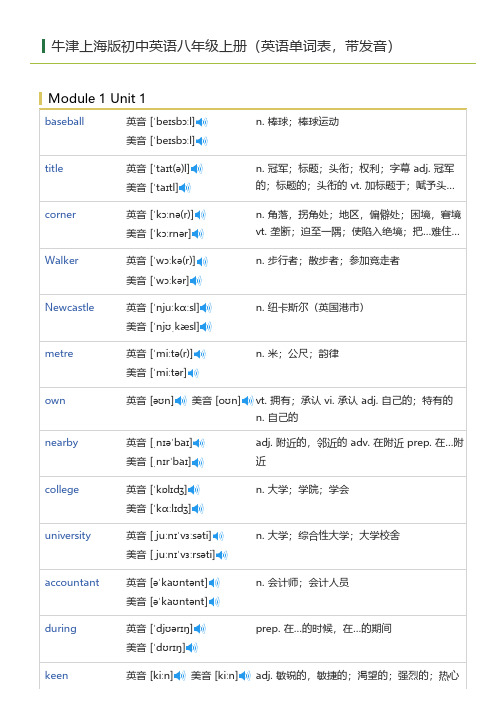
牛津上海版初中英语八年级上册(英语单词表,带发音)Module 1 Unit 1baseball英音 [ˈbeɪsbɔːl]美音 [ˈbeɪsbɔːl]n. 棒球;棒球运动title英音 [ˈtaɪt(ə)l]美音 [ˈtaɪtl]n. 冠军;标题;头衔;权利;字幕 adj. 冠军的;标题的;头衔的 vt. 加标题于;赋予头…corner英音 [ˈkɔːnə(r)]美音 [ˈkɔːrnər]n. 角落,拐角处;地区,偏僻处;困境,窘境vt. 垄断;迫至一隅;使陷入绝境;把…难住…Walker英音 [ˈwɔːkə(r)]美音 [ˈwɔːkər]n. 步行者;散步者;参加竞走者Newcastle英音 [ˈnjuːkɑːsl]美音 [ˈnjʊˌkæsl]n. 纽卡斯尔(英国港市)metre英音 [ˈmiːtə(r)]美音 [ˈmiːtər]n. 米;公尺;韵律own英音 [əʊn]美音 [oʊn]vt. 拥有;承认 vi. 承认 adj. 自己的;特有的n. 自己的nearby英音 [ˌnɪəˈbaɪ]美音 [ˌnɪrˈbaɪ]adj. 附近的,邻近的 adv. 在附近 prep. 在…附近college英音 [ˈkɒlɪdʒ]美音 [ˈkɑːlɪdʒ]n. 大学;学院;学会university英音 [ˌjuːnɪˈvɜːs əti]美音 [ˌjuːnɪˈvɜːrs əti]n. 大学;综合性大学;大学校舍accountant英音 [əˈkaʊnt ənt]美音 [əˈkaʊntənt]n. 会计师;会计人员during英音 [ˈdjʊər ɪŋ]美音 [ˈdʊrɪŋ]prep. 在…的时候,在…的期间keen英音 [ki ːn]美音 [ki ːn]adj. 敏锐的,敏捷的;渴望的;强烈的;热心Module 1 Unit 2的;锐利的n痛哭挽歌keen on热衷于;喜爱;喜欢be keen on na. 喜爱ski英音 [skiː]美音 [skiː]n. 滑雪橇 vi. 滑雪 adj. 滑雪(用)的table tennis英音 ['teɪb(ə)l'tenɪs]美音 [ˈteɪbl tenɪs]n. 乒乓球运动best 英音 [best]美音 [best]n. 最好的人,最好的事物;最佳状态 adj. 最好的 vt. 打败,胜过 adv. 最好地physics英音 [ˈfɪzɪks]美音 [ˈfɪzɪks]n. 物理学;物理现象ambition英音 [æmˈbɪʃn]美音 [æmˈbɪʃ(ə)n]n. 野心,雄心;抱负,志向 vt. 追求;有…野心maybe英音 [ˈmeɪbi]美音 [ˈmeɪbi]adv. 也许;可能;大概 n. 可能性;不确定性enclose英音 [ɪnˈkləʊz]美音 [ɪnˈkloʊz]vt. 围绕;装入;放入封套height英音 [haɪt]美音 [haɪt]n. 高地;高度;身高;顶点dream英音 [driːm]美音 [driːm]n. 梦想,愿望;梦 adj. 梦的;理想的;不切实际的 vt. 梦想;做梦;想到 vi. 梦想;做梦…probably英音 [ˈprɒbəbli]美音 [ˈprɑːbəbli]adv. 大概;或许;很可能tie英音 [taɪ]美音 [taɪ]n. 领带;平局;鞋带;领结;不分胜负 vi. 打结;不分胜负;被用带(或绳子等)系住 vt.…roof英音 [ruːf]美音 [ruːf]n. 屋顶;最高处,顶部;最高限度 vt. 给…盖屋顶,覆盖similar英音 [ˈsɪmələ(r)]n. 类似物 adj. 相似的美音 [ˈsɪmələr]similar to v. 与…类似be similar to na. 像expect英音 [ɪkˈspekt]美音 [ɪkˈspekt]vi. 期待;预期 vt. 期望;指望;认为;预料business英音 [ˈbɪznəs]美音 [ˈbɪznəs]n. 商业;[贸易] 生意;[贸易] 交易;事情whizz-kid英音 [ˈwɪz kɪd]美音 [ˈwɪz kɪd]n. (尤指在金融方面的)神童, 奇才successful英音 [səkˈsesf(ə)l]美音 [səkˈsesfl]adj. 成功的;一帆风顺的put on英音 [pʊt ɒn]美音 [pʊt ɑːn]na. 假话luckily英音 [ˈlʌkɪli]美音 [ˈlʌkɪli]adv. 幸好,侥幸;幸运地popular英音 [ˈpɒpjələ(r)]美音 [ˈpɑːpjələr]adj. 流行的,通俗的;受欢迎的;大众的;普及的responsible英音 [rɪˈspɒnsəb(ə)l]美音 [rɪˈspɑːnsəbl]adj. 负责的,可靠的;有责任的responsible for na. 为…负责;是造成…的原因be responsibleforv. 负责;担负sale英音 [seɪl]美音 [seɪl]n. 销售;出售;拍卖;销售额;廉价出售client英音 [ˈklaɪənt]美音 [ˈklaɪənt]n. [经] 客户;顾客;委托人boring英音 [ˈbɔːrɪŋ]美音 [ˈbɔːrɪŋ]n. 钻孔 adj. 无聊的;令人厌烦的 v. 钻孔;使厌烦;挖空(bore的ing形式)simple英音 [ˈsɪmp(ə)l]n. 笨蛋;愚蠢的行为;出身低微者 adj. 简单美音 [ˈsɪmpl]的;单纯的;天真的achieve英音 [əˈtʃiːv]美音 [əˈtʃiːv]vt. 取得;获得;实现;成功 vi. 达到预期的目的,实现预期的结果,如愿以偿fail英音 [feɪl]美音 [feɪl]n. 不及格 vi. 失败,不及格;破产;缺乏;衰退 vt. 不及格;使失望;忘记;舍弃exam英音 [ɪɡˈzæm]美音 [ɪɡˈzæm]n. 考试;测验return英音 [rɪˈtɜːn]美音 [rɪˈtɜːrn]vi. 返回;报答 adj. 报答的;回程的;返回的vt. 返回;报答 n. 返回;归还;回球attend英音 [əˈtend]美音 [əˈtend]vi. 出席;致力于;照料;照顾 vt. 出席;上(大学等);照料;招待;陪伴assist英音 [əˈsɪst]美音 [əˈsɪst]n. 帮助;助攻 vi. 参加;出席 vt. 帮助;促进continue英音 [kənˈtɪnjuː]美音 [kənˈtɪnjuː]vt. 继续说…;使…继续;使…延长 vi. 继续,延续;仍旧,连续seldom英音 [ˈseldəm]美音 [ˈseldəm]adv. 很少,不常usual英音 [ˈjuːʒuəl]美音 [ˈjuːʒuəl; ˈjuːʒəl]adj. 通常的,惯例的;平常的repeat英音 [rɪˈpiːt]美音 [rɪˈpiːt]n. 重复;副本 vi. 重做;重复发生 vt. 重复;复制;背诵explain英音 [ɪkˈspleɪn]美音 [ɪkˈspleɪn]v. 说明;解释energy英音 [ˈenədʒi]美音 [ˈenərdʒi]n. [物] 能量;精力;活力;精神cell 英音 [sel]美音 [sel]n. 细胞;电池;蜂房的巢室;单人小室 vi. 住在牢房或小室中force英音 [fɔːs]美音 [fɔːrs]n. 力量;武力;军队;魄力 vt. 促使,推动;强迫;强加Module 1 Unit 3heat 英音 [hi ːt]美音 [hi ːt]n. 高温;压力;热度;热烈 vt. 使激动;把…加热physical 英音 [ˈf ɪz ɪk(ə)l]美音 [ˈf ɪz ɪkl]n. 体格检查 adj. [物] 物理的;身体的;物质的;根据自然规律的,符合自然法则的article 英音 [ˈɑːt ɪk(ə)l]美音 [ˈɑːrt ɪk(ə)l]n. 文章;物品;条款;[语] 冠词 vt. 订约将…收为学徒或见习生;使…受协议条款的约束 v…ever英音 [ˈev ə(r)]美音 [ˈev ər]adv. 永远;曾经;究竟argue英音 [ˈɑːɡju ː]美音 [ˈɑːrɡju ː]vi. 争论,辩论;提出理由 vt. 辩论,争论;证明;说服deal with na. 办理;对待;与…交涉;与…交易trouble英音 [ˈtr ʌb(ə)l]美音 [ˈtr ʌbl]n. 麻烦;烦恼;故障;动乱 vt. 麻烦;使烦恼;折磨 vi. 费心,烦恼unusual英音 [ʌn ˈju ːʒu əl]美音 [ʌn ˈju ːʒu əl; ʌn ˈju ːʒəl]adj. 不寻常的;与众不同的;不平常的happen to v. 发生于argument英音 [ˈɑːɡjum ənt]美音 [ˈɑːrɡjum ənt]n. 论证;论据;争吵;内容提要hold out na. 伸出;提出;维持;制止crowd英音 [kra ʊd]美音 [kra ʊd]n. 群众,一伙;一堆,许多,大众 v. 拥挤,挤满,挤进vt. 挤满,将...塞进;催促,催逼 vi. 挤,拥挤,聚集stare英音 [ste ə(r)]美音 [ster]n. 凝视;注视 vt. 凝视,盯着看 vi. 凝视,盯着看;显眼through英音 [θru ː]美音 [θru ː]prep. 通过;穿过;凭借 adj. 直达的;过境的;完结的 adv. 彻底;从头至尾quietly英音 [ˈkwa ɪətli]美音 [ˈkwa ɪətli]adv. 安静地;秘密地;平稳地be going on发生;进行;正在发生steal英音 [stiːl]美音 [stiːl]n. 偷窃;便宜货;偷垒;断球 vt. 剽窃;偷偷地做;偷窃 vi. 窃取;偷偷地行动;偷垒purse英音 [pɜːs]美音 [pɜːrs]n. (女士)手提袋;(国家、家庭、团体等的) 财力 vt. (嘴巴)皱起,使缩拢;撅嘴postcard英音 [ˈpəʊstkɑːd]美音 [ˈpoʊstkɑːrd]n. 明信片gone英音 [ɡɒn]美音 [ɡɔːn]v. 去(go的过去分词) adj. 离去的;死去的;用光的gate英音 [ɡeɪt]美音 [ɡeɪt]n. 大门;出入口;门道 vt. 给…装大门aboard英音 [əˈbɔːd]美音 [əˈbɔːrd]prep. 在…上 adv. 在飞机上;[船] 在船上;在火车上go after na. 追求strange英音 [streɪndʒ]美音 [streɪndʒ]adj. 奇怪的;陌生的;外行的 adv. 奇怪地;陌生地,冷淡地afraid of un. 难;怕;害怕;不敢正视be afraid of na. 怕dial英音 [ˈdaɪəl]美音 [ˈdaɪəl]n. 转盘;刻度盘;钟面 vt. 给…拨号打电话 vi.拨号theft 英音 [θeft]美音 [θeft]n. 盗窃;偷;赃物detail英音 [ˈdiːteɪl]美音 [ˈdiːteɪlˌdɪˈteɪl]n. 细节,详情 vt. 详述;选派 vi. 画详图put ... down na. 平定;贬低(的话);(飞机的)降落get off na. 下车;脱下(衣服等);脱(衣);下(马) worried英音 [ˈwʌrid]美音 [ˈwɜːrid]adj. 担心的Module 1 Unit 4well done 英音 [ˌwel ˈd ʌn]美音 [ˌwel ˈd ʌn]adj. 熟透的;煮透了的;烧烂了的realize 英音 [ˈri ːəla ɪz; ˈr ɪəla ɪz]美音 [ˈri ːəla ɪz]vt. 实现;认识到;了解;将某物卖得,把(证券等)变成现钱;变卖fight 英音 [fa ɪt]美音 [fa ɪt]n. 打架;战斗,斗志 vi. 打架;与…打仗,与…斗争;反对…提案rather 英音 [ˈrɑːðə(r)]美音 [ˈræðər]adv. 宁可,宁愿;相当 int. 当然啦(回答问题时用)downstairs 英音 [ˌda ʊn ˈste əz]美音 [ˌda ʊn ˈsterz]n. 楼下 adj. 楼下的 adv. 在楼下divide英音 [d ɪˈva ɪd]美音 [d ɪˈva ɪd]n. [地理] 分水岭,分水线 vt. 划分;除;分开;使产生分歧 vi. 分开;意见分歧degree英音 [d ɪˈɡri ː]美音 [d ɪˈɡri ː]n. 程度,等级;度;学位;阶层especially英音 [ɪˈspe ʃəli]美音 [ɪˈspe ʃəli]adv. 特别;尤其;格外calculate英音 [ˈkælkjule ɪt]美音 [ˈkælkjule ɪt]vt. 计算;预测;认为;打算 vi. 计算;以为;作打算brain英音 [bre ɪn]美音 [bre ɪn]n. 头脑,智力;脑袋 vt. 猛击…的头部part英音 [pɑːt]美音 [pɑːrt]n. 部分;角色;零件;一些;片段 adj. 部分的 vt. 分离;分配;分开 adv. 部分地 vi. 断…language英音 [ˈlæŋɡw ɪd ʒ]美音 [ˈlæŋɡw ɪd ʒ]n. 语言;语言文字;表达能力nearly英音 [ˈn ɪəli]美音 [ˈn ɪrli]adv. 差不多,几乎;密切地system英音 [ˈs ɪst əm]n. 制度,体制;系统;方法invent英音 [ɪnˈvent]美音 [ɪnˈvent]vt. 发明;创造;虚构develop英音 [dɪˈveləp]美音 [dɪˈveləp]vi. 发育;生长;进化;显露 vt. 开发;进步;使成长;使显影invention英音 [ɪnˈvenʃn]美音 [ɪnˈvenʃn]n. 发明;发明物;虚构;发明才能abacus英音 [ˈæbəkəs]美音 [ˈæbəkəs]n. 算盘accurate英音 [ˈækjərət]美音 [ˈækjərət]adj. 精确的electronic英音 [ɪˌlekˈtrɒnɪk]美音 [ɪˌlekˈtrɑːnɪk]adj. 电子的 n. 电子电路;电子器件calculator英音 [ˈkælkjuleɪtə(r)]美音 [ˈkælkjuleɪtər]n. 计算器;计算者subtract英音 [səbˈtrækt]美音 [səbˈtrækt]vt. 减去;扣掉multiply英音 [ˈmʌltɪplaɪ]美音 [ˈmʌltɪplaɪ]vt. 乘;使增加;使繁殖;使相乘 vi. 乘;繁殖;增加 adv. 多样地;复合地 adj. 多层的…percentage英音 [pəˈsentɪdʒ]美音 [pərˈsentɪdʒ]n. 百分比;百分率,百分数square root n. 平方根powerful英音 [ˈpaʊəf(ə)l]美音 [ˈpaʊərfl]adj. 强大的;强有力的 adv. 很;非常in a flash na. 刹那间;瞬间;一下子calculation英音 [ˌkælkjuˈleɪʃn]美音 [ˌkælkjuˈleɪʃn]n. 计算;估计;计算的结果;深思熟虑whole英音 [həʊl]n. 整体;全部 adj. 完整的;纯粹的Module 1 Unit 5lifetime英音 [ˈla ɪfta ɪm]美音 [ˈla ɪfta ɪm]n. 一生;寿命;终生;使用期 adj. 一生的;终身的against英音 [əˈɡenst; əˈɡe ɪnst]美音 [əˈɡenst; əˈɡe ɪnst]prep. 反对,违反;靠;倚;防备 adj. 不利的;对立的living英音 [ˈl ɪv ɪŋ]美音 [ˈl ɪv ɪŋ]adj. 活的;现存的;活跃的;逼真的 n. 生活;生存;生计 v. 生活;居住(live的ing形…human英音 [ˈhju ːm ən]美音 [ˈhju ːm ən]n. 人;人类 adj. 人的;人类的following英音 [ˈf ɒl əʊɪŋ]美音 [ˈfɑːlo ʊɪŋ]n. 下列事物;一批追随者 v. 跟随;沿行(follow的ing形式) adj. 下面的;其次的…amazing英音 [əˈme ɪz ɪŋ]美音 [əˈme ɪz ɪŋ]adj. 令人惊异的 v. 使吃惊(amaze的ing形式)solve英音 [s ɒlv]美音 [sɑːlv]vt. 解决;解答;溶解 vi. 作解答lightning英音 [ˈla ɪtn ɪŋ]美音 [ˈla ɪtn ɪŋ]adj. 闪电的;快速的 n. 闪电 vi. 闪电like lightning na. 闪电似的program英音 [ˈpr əʊɡræm]美音 [ˈpro ʊɡræm]n. 程序;计划;大纲 vt. 用程序指令;为…制订计划;为…安排节目 vi. 编程序;安排节目…power英音 [ˈpa ʊə(r)]美音 [ˈpa ʊər]n. 力量,能力;电力,功率;政权,势力;[数] 幂 adj. 借影响有权势人物以操纵权力的…complete英音 [k əm ˈpli ːt]美音 [k əm ˈpli ːt]adj. 完整的;完全的;彻底的 vt. 完成check英音 [t ʃek]美音 [t ʃek]n. <美>支票;制止,抑制;检验,核对 vi. 核实,查核;中止;打勾;[象棋]将一军 vt. 检…Africa英音 [ˈæfr ɪk ə]n. 非洲Europe英音 [ˈjʊərəp]美音 [ˈjʊrəp]n. 欧洲fierce英音 [fɪəs]美音 [fɪrs]adj. 凶猛的;猛烈的;暴躁的though英音 [ðəʊ]美音 [ðoʊ]conj. 虽然;尽管 prep. 但 adv. 可是,虽然;不过;然而look up v. 查找;查阅;探望;看望encyclopaedia英音 [ɪnˌsaɪkləˈpiːdiə]美音 [ɪnˌsaɪkləˈpiːdiə; enˌsaɪkləˈpiːdiə]n. 百科全书dinosaur英音 [ˈdaɪnəsɔː(r)]美音 [ˈdaɪnəsɔːr]n. 恐龙;过时、落伍的人或事物exist英音 [ɪɡˈzɪst]美音 [ɪɡˈzɪst]vi. 存在;生存;生活;继续存在even英音 [ˈiːv(ə)n]美音 [ˈiːvn]adj. [数] 偶数的;平坦的;相等的 adv. 甚至;即使;还;实际上 vt. 使平坦;使相等 v…harmless英音 [ˈhɑːmləs]美音 [ˈhɑːrmləs]adj. 无害的;无恶意的harmful英音 [ˈhɑːmf(ə)l]美音 [ˈhɑːrmfl]adj. 有害的;能造成损害的die out na. 死绝nobody英音 [ˈnəʊbədi]美音 [ˈnoʊbədi]pron. 无人,没有人;没有任何人 n. 无名小卒;小人物know about v. 知道skeleton英音 [ˈskelɪtn]美音 [ˈskelɪtn]n. 骨架,骨骼;纲要;骨瘦如柴的人 adj. 骨骼的;骨瘦如柴的;概略的footprint英音 [ˈfʊtprɪnt]美音 [ˈfʊtprɪnt]n. 足迹;脚印leave ... behind na. 遗留;留下;追过;留在后头thinker英音 [ˈθɪŋkə(r)]美音 [ˈθɪŋkər]n. 思想家;思想者Greece英音 [ɡriːs]美音 [ɡriːs]希腊(欧洲南部国家)as ... as possible na. 尽(快)jar英音 [dʒɑː(r)]美音 [dʒɑːr]n. 罐;广口瓶;震动;刺耳声 vi. 冲突;不一致;震惊;发刺耳声 vt. 震动;刺激;使震动amusementparkn. 游乐场;娱乐园create英音 [kriˈeɪt]美音 [kriˈeɪt]vt. 创造,创作;造成character英音 [ˈkærəktə(r)]美音 [ˈkærəktər]n. 性格,品质;特性;角色;[计] 字符 vt.印,刻;使具有特征mail英音 [meɪl]美音 [meɪl]n. 邮件;邮政,邮递;盔甲 vt. 邮寄;给…穿盔甲 vi. 邮寄;寄出real英音 [ˈriːəl; rɪəl]美音 [ˈriːəl]n. 现实;实数 adj. 实际的;真实的;实在的adv. 真正地;确实地while英音 [waɪl]美音 [waɪl]conj. 虽然;然而;当……的时候 n. 一会儿;一段时间 vt. 消磨;轻松地度过cause英音 [kɔːz]美音 [kɔːz]n. 原因;事业;目标 vt. 引起;使遭受harm英音 [hɑːm]美音 [hɑːrm]n. 伤害;损害 vt. 伤害;危害;损害believe英音 [bɪˈliːv]美音 [bɪˈliːv]vi. 信任;料想;笃信宗教 vt. 相信;认为;信任die of na. 因…而死disease英音 [dɪˈziːz]美音 [dɪˈziːz]n. 病,[医] 疾病;弊病 vt. 传染;使…有病government英音 [ˈɡʌvənmənt]n. 政府;政体;管辖Module 1 Unit 6美音 [ˈɡʌv ərnm ənt]repair英音 [r ɪˈpe ə(r)]美音 [r ɪˈper]n. 修理,修补;修补部位 vt. 修理;恢复;补救,纠正 vi. 修理;修复fee 英音 [fi ː]美音 [fi ː]n. 费用;酬金;小费 vt. 付费给……journey英音 [ˈd ʒɜːni]美音 [ˈd ʒɜːrni]n. 旅行;行程 vi. 旅行captain英音 [ˈkæpt ɪn]美音 [ˈkæpt ɪn]n. 队长,首领;船长;上尉;海军上校 vt. 指挥;率领take place na. 发生;举行in trouble na. 为难;被捕;未婚怀孕navigator英音 [ˈnæv ɪɡe ɪt ə(r)]美音 [ˈnæv ɪɡe ɪt ər]n. 航海家;领航员;驾驶员lost英音 [l ɒst]美音 [l ɔːst]adj. 失去的;丧失的;迷惑的 v. 遗失(lose的过去分词);失败run out of na. 用光…unexplored英音 [ˌʌn ɪk ˈspl ɔːd]美音 [ˌʌn ɪk ˈspl ɔːrd]adj. [地质] 未勘查过的bring down na. 降低;击落;削减;使落下[跌落]valley英音 [ˈvæli]美音 [ˈvæli]n. 山谷;流域;溪谷close to na. 接近于;在附近cliff 英音 [kl ɪf]美音 [kl ɪf]n. 悬崖;绝壁rock英音 [r ɒk]美音 [rɑːk]n. 岩石;摇滚乐;暗礁 vt. 摇动;使摇晃 vi.摇动;摇晃storey英音 [ˈst ɔːri]美音 [ˈst ɔːri]n. [建] 楼层;叠架的一层approach英音 [əˈprəʊtʃ]美音 [əˈproʊtʃ]n. 方法;途径;接近 vt. 接近;着手处理 vi.靠近monster英音 [ˈmɒnstə(r)]美音 [ˈmɑːnstər]n. 怪物;巨人,巨兽;残忍的人 adj. 巨大的,庞大的clearly英音 [ˈklɪəli]美音 [ˈklɪrli]adv. 清晰地;明显地;无疑地;明净地partly英音 [ˈpɑːtli]美音 [ˈpɑːrtli]adv. 部分地;在一定程度上kangaroo英音 [ˌkæŋɡəˈruː]美音 [ˌkæŋɡəˈruː]n. 袋鼠giant英音 [ˈdʒaɪənt]美音 [ˈdʒaɪənt]n. 巨人;伟人;[动] 巨大的动物 adj. 巨大的;巨人般的except英音 [ɪkˈsept]美音 [ɪkˈsept]conj. 除了;要不是 prep. 除…之外 vt. 不计;把…除外 vi. 反对single英音 [ˈsɪŋɡ(ə)l]美音 [ˈsɪŋɡl]n. 一个;单打;单程票 adj. 单一的;单身的;单程的 vt. 选出 vi. 击出一垒安打roar英音 [rɔː(r)]美音 [rɔːr]n. 咆哮;吼;轰鸣 vi. 咆哮;吼叫;喧闹 vt.咆哮;呼喊;使……轰鸣blood英音 [blʌd]美音 [blʌd]n. 血,血液;血统 vt. 从…抽血;使先取得经验alien英音 [ˈeɪliən]美音 [ˈeɪliən]n. 外国人,外侨;外星人 adj. 外国的;相异的,性质不同的;不相容的 vt. 让渡,转让steel英音 [stiːl]美音 [stiːl]n. 钢铁;钢制品;坚固 adj. 钢制的;钢铁业的;坚强的 vt. 钢化;使冷酷rat 英音 [ræt]美音 [ræt]n. 鼠;卑鄙小人,叛徒 vi. 捕鼠;背叛,告密trap 英音 [træp]美音 [træp]n. 陷阱;圈套;[建] 存水湾 vt. 诱捕;使…受限制;使…陷入困境 vi. 设陷阱magnet英音 [ˈmæɡnət]美音 [ˈmæɡnət]n. 磁铁;[电磁] 磁体;磁石Module 1 Unit 7cage 英音 [ke ɪd ʒ]美音 [ke ɪd ʒ]n. 笼,兽笼;牢房,监狱 vt. 把…关进笼子;把…囚禁起来peace 英音 [pi ːs]美音 [pi ːs]n. 和平;平静;和睦;秩序in peace na. 平平安安;安心in pieces na. 破碎;(意见等)分歧favour英音 [ˈfe ɪv ə(r)]美音 [ˈfe ɪv ər]n. 偏爱;赞同;善行 vt. 赞成;喜爱;有助于do ... a favour 帮忙;帮个忙;帮助某人trust英音 [tr ʌst]美音 [tr ʌst]n. 信任,信赖;责任;托拉斯 vt. 信任,信赖;盼望;赊卖给 vi. 信任,信赖;依靠offer英音 [ˈɒf ə(r)]美音 [ˈɔːf ər]vt. 提供;出价;试图 n. 提议;出价;意图;录取通知书 vi. 提议;出现;献祭;求婚frighten英音 [ˈfra ɪtn]美音 [ˈfra ɪtn]vt. 使惊吓;吓唬… vi. 害怕,惊恐crew英音 [kru ː]美音 [kru ː]n. 队,组;全体人员,全体船员 vt. 使当船员vi. 一起工作arrange 英音 [əˈre ɪnd ʒ]美音 [əˈre ɪnd ʒ]vi. 安排;排列;协商 vt. 安排;排列;整理below 英音 [b ɪˈl əʊ]美音 [b ɪˈlo ʊ]prep. 在…下面 adv. 在下面,在较低处;在本页下面per英音 [p ə(r)]美音 [p ər; p ɜːr]prep. 每;经;按照;每一escape英音 [ɪˈske ɪp]美音 [ɪˈske ɪp]n. 逃跑;逃亡;逃走;逃跑工具或方法;野生种;泄漏 vi. 逃脱;避开;溜走;(气体,液…escape from v. 逃脱kill英音 [k ɪl]美音 [k ɪl]vt. 杀死;扼杀;使终止;抵消 vi. 杀死 n. 杀戮;屠杀 adj. 致命的;致死的戮;屠杀j致命的;致死的lie英音 [laɪ]美音 [laɪ]vi. 躺;说谎;位于;展现 vt. 谎骗 n. 谎言;位置fall asleep na. 入睡snore英音 [snɔː(r)]美音 [snɔːr]n. 鼾声 vt. 打鼾 vi. 打呼噜;打着鼾声渡过laser英音 [ˈleɪzə(r)]美音 [ˈleɪzər]n. 激光torch英音 [tɔːtʃ]美音 [tɔːrtʃ]n. 火把,火炬;手电筒;启发之物 vt. 用火炬点燃 vi. 像火炬一样燃烧case英音 [keɪs]美音 [keɪs]n. 情况;实例;箱 vt. 包围;把…装于容器中attract英音 [əˈtrækt]美音 [əˈtrækt]vt. 吸引;引起 vi. 吸引;有吸引力interrupt英音 [ˌɪntəˈrʌpt]美音 [ˌɪntəˈrʌpt]n. 中断 vt. 中断;打断;插嘴;妨碍 vi. 打断;打扰moment英音 [ˈməʊmənt]美音 [ˈmoʊmənt]n. 片刻,瞬间,时刻;重要,契机aim英音 [eɪm]美音 [eɪm]n. 目的;目标;对准 vt. 目的在于;引导;把…对准 vi. 打算;对准目标;瞄准aim at v. 目的在于beam英音 [biːm]美音 [biːm]n. 横梁;光线;电波;船宽;[计量] 秤杆 vt.发送;以梁支撑;用…照射;流露 vi. 照射;…hit英音 [hɪt]美音 [hɪt]n. 打;打击;(演出等)成功;讽刺 vt. 打击;袭击;碰撞;偶然发现;伤…的感情 vi.…attack英音 [əˈtæk]美音 [əˈtæk]n. 攻击;抨击;疾病发作 vt. 攻击;抨击;动手干 vi. 攻击;腐蚀damage英音 [ˈdæmɪdʒ]美音 [ˈdæmɪdʒ]vi. 损害;损毁 vt. 损害,毁坏 n. 损害;损毁;赔偿金finished英音 [ˈfɪnɪʃt]美音 [ˈfɪnɪʃt]v. 完成;结束;毁掉(finish的过去分词形式)adj完结的完成的;精巧的make sure英音 [meɪk ʃʊə(r)]美音 [meɪk ʃʊr]na. 尽力做到;深信;务必;务请whisper英音 [ˈwɪspə(r)]美音 [ˈwɪspər]n. 私语;谣传;飒飒的声音 vi. 耳语;密谈;飒飒地响 vt. 低声说出be done for na. 〈非正式〉完蛋;坏了;累坏了panic英音 [ˈpænɪk]美音 [ˈpænɪk]n. 恐慌,惊慌;大恐慌 adj. 恐慌的;没有理由的 vt. 使恐慌 vi. 十分惊慌freedom英音 [ˈfriːdəm]美音 [ˈfriːdəm]n. 自由,自主;直率figure英音 [ˈfɪɡə(r)]美音 [ˈfɪɡjər]n. 数字;人物;图形;价格;(人的)体形;画像 vt. 计算;认为;描绘;象征 vi. 计算;…silently英音 [ˈsaɪləntli]美音 [ˈsaɪləntli]adv. 默默地;静静地search英音 [sɜːtʃ]美音 [sɜːrtʃ]n. 搜寻;探究,查究 vt. 搜索;搜寻;调查;搜查;探求 vi. 搜寻;调查;探求crash英音 [kræʃ]美音 [kræʃ]n. 撞碎;坠毁;破产;轰隆声;睡觉 vi. 摔碎;坠落;发出隆隆声;(金融企业等)破产 v…base英音 [beɪs]美音 [beɪs]n. 基础;底部;垒 adj. 卑鄙的;低劣的 vt.以…作基础petrol英音 [ˈpetrəl]美音 [ˈpetrəl]n. (英)汽油decide英音 [dɪˈsaɪd]美音 [dɪˈsaɪd]vi. 决定,下决心 vt. 决定;解决;判决。
牛津上海版八年级上册 Unit 3 Trouble 教学设计
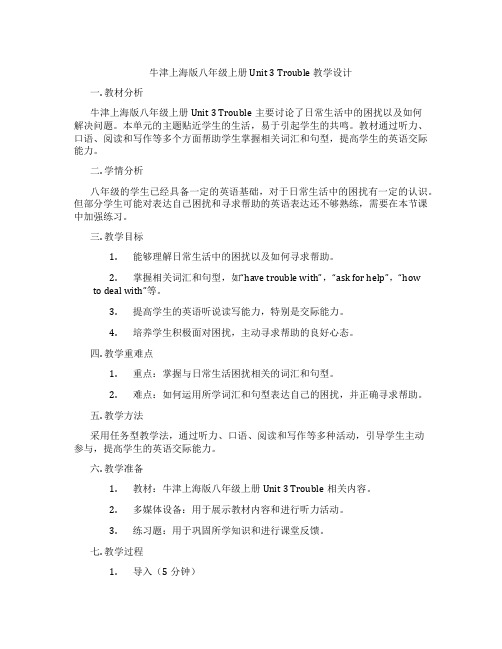
牛津上海版八年级上册 Unit 3 Trouble 教学设计一. 教材分析牛津上海版八年级上册Unit 3 Trouble主要讨论了日常生活中的困扰以及如何解决问题。
本单元的主题贴近学生的生活,易于引起学生的共鸣。
教材通过听力、口语、阅读和写作等多个方面帮助学生掌握相关词汇和句型,提高学生的英语交际能力。
二. 学情分析八年级的学生已经具备一定的英语基础,对于日常生活中的困扰有一定的认识。
但部分学生可能对表达自己困扰和寻求帮助的英语表达还不够熟练,需要在本节课中加强练习。
三. 教学目标1.能够理解日常生活中的困扰以及如何寻求帮助。
2.掌握相关词汇和句型,如“have trouble with”,“ask for help”,“howto deal with”等。
3.提高学生的英语听说读写能力,特别是交际能力。
4.培养学生积极面对困扰,主动寻求帮助的良好心态。
四. 教学重难点1.重点:掌握与日常生活困扰相关的词汇和句型。
2.难点:如何运用所学词汇和句型表达自己的困扰,并正确寻求帮助。
五. 教学方法采用任务型教学法,通过听力、口语、阅读和写作等多种活动,引导学生主动参与,提高学生的英语交际能力。
六. 教学准备1.教材:牛津上海版八年级上册Unit 3 Trouble相关内容。
2.多媒体设备:用于展示教材内容和进行听力活动。
3.练习题:用于巩固所学知识和进行课堂反馈。
七. 教学过程1.导入(5分钟)通过提问方式引导学生谈论日常生活中遇到的困扰,如“Do you have any trouble in your dly life? What is it and how do you deal with it?”,让学生发表自己的观点。
2.呈现(10分钟)利用多媒体展示教材中的图片和情景,引导学生理解和掌握相关词汇和句型。
如展示一张图片,图片中一个人在电脑前苦恼,让学生用英语描述这个情景,并引导学生使用“have trouble with”和“ask for help”等表达方式。
沪教牛津版初二上册英语知识点总结全册含习题和答案
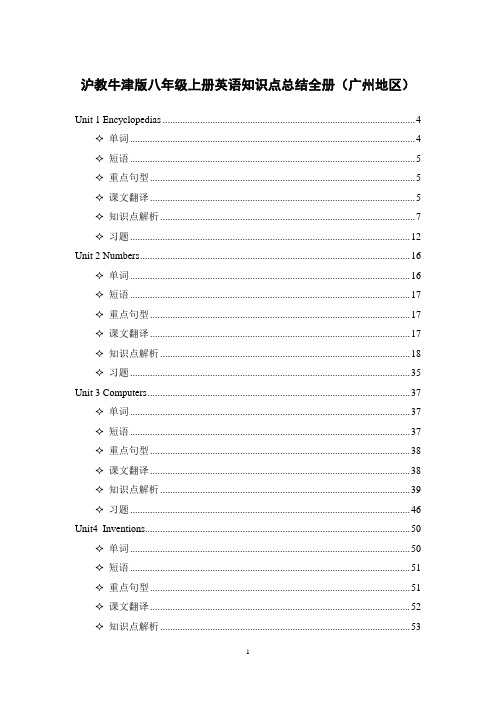
沪教牛津版八年级上册英语知识点总结全册(广州地区)Unit 1 Encyclopedias (4)✧ 单词 (4)✧ 短语 (5)✧ 重点句型 (5)✧ 课文翻译 (5)✧ 知识点解析 (7)✧ 习题 (12)Unit 2 Numbers (16)✧ 单词 (16)✧ 短语 (17)✧ 重点句型 (17)✧ 课文翻译 (17)✧ 知识点解析 (18)✧ 习题 (35)Unit 3 Computers (37)✧ 单词 (37)✧ 短语 (37)✧ 重点句型 (38)✧ 课文翻译 (38)✧ 知识点解析 (39)✧ 习题 (46)Unit4 Inventions (50)✧ 单词 (50)✧ 短语 (51)✧ 重点句型 (51)✧ 课文翻译 (52)✧ 知识点解析 (53)✧ 习题 (56)Unit5 Educational exchange (59)✧ 单词 (59)✧ 短语 (59)✧ 重点句型 (60)✧ 课文翻译 (61)✧ 知识点解析 (62)✧ 习题 (70)Unit 6 Ancient stories (73)✧ 单词 (73)✧ 短语 (74)✧ 重点句型 (74)✧ 课文翻译 (75)✧ 知识点解析 (76)✧ 习题 (81)Unit 7 Memory (86)✧ 单词 (86)✧ 短语 (87)✧ 重点句型 (88)✧ 课文翻译 (88)✧ 知识点解析 (89)✧ 习题 (96)Unit 8 English Week (100)✧ 单词 (100)✧ 短语 (101)✧ 重点句型 (101)✧ 课文翻译 (101)✧ 知识点解析 (103)✧ 习题 (107)每单元必考语法点预览Unit 1 some与any的用法& 复合不定代词somebody, anybody, nobody等的用法Unit 2基数词及数字的表达& 序数词Unit 3形容词的比较级与最高级Unit 4 good, bad, far & (not) as…as…Unit 5现在完成时& already, yet, ever, neverUnit 6 现在完成时中since, for & 现在完成时与一般过去时的区别Unit 7(真实性)条件状语从句& if…not 与unlessUnit 8情态动词should, had betterUnit 1 Encyclopedias 单词✧短语1.in the countryside 在乡村,在农村11.for example 例如2.human being 人12.next to 紧挨着3.die out 灭绝,消失13.look up 查阅4.find out 了解,弄清14.live on Earth 生活在地球上5.go for a walk 去散步15.an Italian painter 一位意大利画家6.be born 出生ed to do sth 过去常常做某事7.more than 多于,超过17.at the end of 在…末尾8.just like 正如,正像18.in the centre 在中心9.how long 多久e out of…从…出来10.would like 想要20.be famous for 以…而闻名✧重点句型1.Some dinosaurs were as small as chickens. 有的恐龙和鸡一样小。
牛津上海版英语八年级上册《Unit4Numbers》说课稿2

牛津上海版英语八年级上册《Unit 4 Numbers》说课稿2一. 教材分析《Unit 4 Numbers》是牛津上海版英语八年级上册的一单元,本单元的主题是数字。
教材以日常生活中常见的数字为话题,通过学习数字的读写、比较大小的方法以及与数字相关的词汇和表达方式,让学生能够熟练运用英语进行数字的交流。
教材内容丰富,贴近生活,有助于激发学生的学习兴趣,提高他们的语言运用能力。
二. 学情分析八年级的学生已经具备了一定的英语基础,对于日常生活中的基本词汇和简单的语法结构有所了解。
然而,他们在口语表达和听力理解方面还存在一定的困难。
因此,在教学过程中,需要关注学生的个体差异,因材施教,尽量让每个学生都能参与到课堂活动中来。
三. 说教学目标1.知识目标:让学生掌握数字的读写规则,学会比较大小的方法,以及与数字相关的词汇和表达方式。
2.能力目标:培养学生运用英语进行数字交流的能力,提高他们的口语表达和听力理解能力。
3.情感目标:激发学生学习英语的兴趣,培养他们积极向上的学习态度。
四. 说教学重难点1.教学重点:数字的读写规则,比较大小的方法,与数字相关的词汇和表达方式。
2.教学难点:数字的读写规则,特别是较大的数字,以及比较大小的方法。
五. 说教学方法与手段1.教学方法:采用任务型教学法,让学生在完成任务的过程中,自然地学习和掌握数字的读写、比较大小的方法以及与数字相关的词汇和表达方式。
2.教学手段:利用多媒体课件、图片、卡片等辅助教学,提高学生的学习兴趣和参与度。
六. 说教学过程1.导入:通过播放一首关于数字的歌曲,让学生在轻松愉快的氛围中进入学习状态。
2.新课呈现:展示一幅生活中常见的场景图,引导学生关注图中的数字,并询问他们一些问题,如:“How many students are there in your class?”等,激发学生的学习兴趣。
3.讲解与实践:讲解数字的读写规则,比较大小的方法,以及与数字相关的词汇和表达方式。
Unit+3+reading+课件+2023-2024学年牛津上海版(试用本)八年级英语上册

• Who did it happen to? Two women tourists and a young man
• Why did the two women and the young man
shout at each other at first? The two women found that the three young man stole a purse from them.
(c) 1
(b) 5-7
(e) 10-11
(a) 2-4
(d) 8-9
now
c. Paul and his father saw a man and
two women arguing at the ferry.
d. Paul's father quickly phoned the police.
e. The police met the ferry when it arrived and caught the man.
walk through ???
✓ What did one of the women say about the young man?
adv. silently
What happens?
✓ What did the young man do after the gates open?
adv. get on a ship, train, bus or a plane
hurry (v.)/(n.) hurry aboard
✓ What did the two women tourists do then?
go after ≈ follow
Байду номын сангаас
牛津上海版英语八年级上册
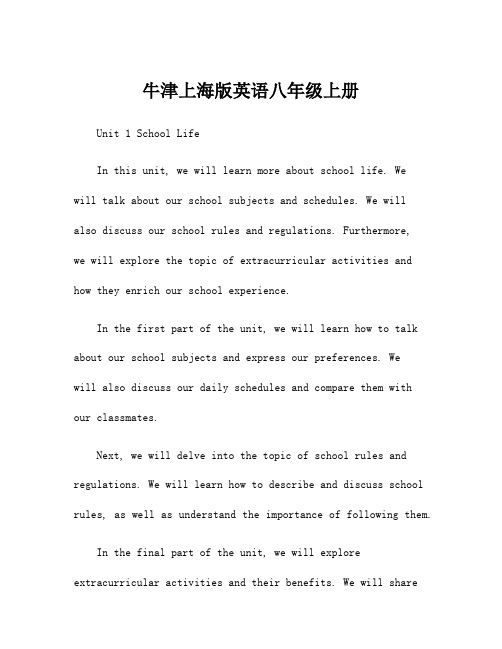
牛津上海版英语八年级上册Unit 1 School LifeIn this unit, we will learn more about school life. Wewill talk about our school subjects and schedules. We willalso discuss our school rules and regulations. Furthermore,we will explore the topic of extracurricular activities and how they enrich our school experience.In the first part of the unit, we will learn how to talk about our school subjects and express our preferences. Wewill also discuss our daily schedules and compare them withour classmates.Next, we will delve into the topic of school rules and regulations. We will learn how to describe and discuss school rules, as well as understand the importance of following them.In the final part of the unit, we will explore extracurricular activities and their benefits. We will shareour experiences with various activities and discuss how they have enriched our school lives.Throughout the unit, we will engage in discussions, group activities, and role-plays to practice and improve our English speaking skills. We will also work on listening, reading, and writing tasks to enhance our overall language proficiency.By the end of the unit, we will have a better understanding of school life and be able to express ourselves more fluently in English. We will also have developed a deeper appreciation for the opportunities and experiencesthat school has to offer.。
八年级牛津上海版英语书上册

八年级牛津上海版英语书上册Unit 1 Our WorldPart 1: Listening and SpeakingIn Unit 1 of the eighth-grade Oxford Shanghai Edition English textbook, students will be introduced to the theme "Our World." This unit focuses on developing students' listening and speaking skills through various engaging activities.The unit begins with a conversation between two friends discussing their summer vacation plans, which aims to familiarize students with common greetings, introductions, and simple questions. Students will be encouraged to actively participate in oral practice to develop their fluency and accuracy in spoken English.Following the conversation, students will listen to a short dialogue about a family's plan to visit the Great Wall of China. This listening activity aims to enhance students' comprehension skills and improve their ability to grasp key information while listening.To further develop their listening skills, students will be exposed to a listening text about different countries and their landmarks. They will be required to identify and understand specific information while listening, such as capital cities, famous landmarks, and geographical features.In the next section, students will engage in pair and group discussions on the topic of countries and customs. They will practice using appropriate expressions to express opinions, agree, or disagree. This activity encouragesstudents to actively participate in oral communication and helps them develop critical thinking skills.Part 2: Reading and WritingIn the second part of Unit 1, students will focus on reading and writing skills. They will explore various reading passages that introduce different aspects of the world, such as geography, culture, and traditions.Students will read an article about the South China Sea, where they will learn about its geographic location, importance, and the challenges it faces. This readingactivity aims to enhance students' reading comprehension abilities and expand their knowledge of worldwide issues.Next, students will study a passage that introduces the Great Barrier Reef in Australia. They will learn about its significance, environmental challenges, and efforts toprotect it. This reading activity aims to improve students' ability to understand and analyze informational texts.In the writing section, students will be guided to write a short paragraph about their favorite tourist attraction. They will be encouraged to use appropriate vocabulary, descriptive language, and sentence structures to expresstheir ideas effectively.To conclude the unit, students will participate in a class debate on the topic of responsible tourism. They will express their opinions, provide arguments, and respond to their peers' ideas. This activity aims to enhance students' critical thinking, persuasive writing, and speaking skills.In summary, Unit 1 of the eighth-grade Oxford Shanghai Edition English textbook, "Our World," is designed to develop students' listening, speaking, reading, and writing skills. Through engaging activities and varied topics, students willexpand their knowledge, improve their language abilities, and build their confidence in English communication.。
八年级上册牛津上海版英语书
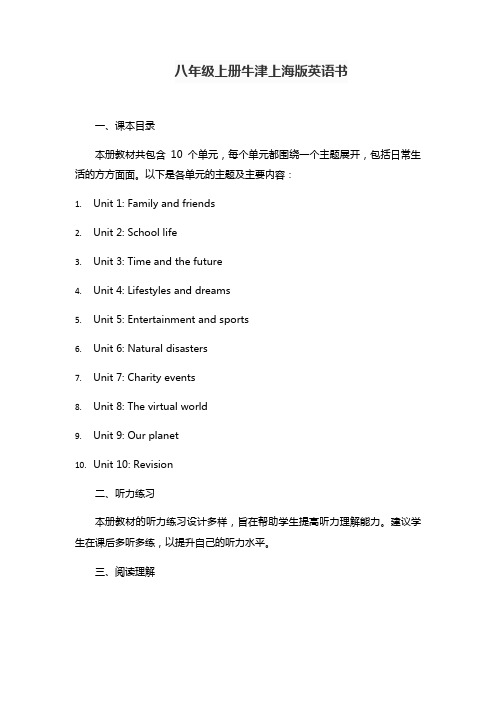
八年级上册牛津上海版英语书一、课本目录本册教材共包含10个单元,每个单元都围绕一个主题展开,包括日常生活的方方面面。
以下是各单元的主题及主要内容:1.Unit 1: Family and friends2.Unit 2: School life3.Unit 3: Time and the future4.Unit 4: Lifestyles and dreams5.Unit 5: Entertainment and sports6.Unit 6: Natural disasters7.Unit 7: Charity events8.Unit 8: The virtual world9.Unit 9: Our planet10.Unit 10: Revision二、听力练习本册教材的听力练习设计多样,旨在帮助学生提高听力理解能力。
建议学生在课后多听多练,以提升自己的听力水平。
三、阅读理解本册教材的阅读材料涉及广泛的题材,包括日常生活、科技、文化等。
学生应通过阅读练习,提高自己的阅读速度和理解能力。
建议学生积极拓展阅读素材,以增加词汇量和知识储备。
四、写作指导本册教材的写作练习注重实际应用,包括写日记、信件、电子邮件等。
学生应按照要求认真完成写作任务,提高自己的英文表达能力。
建议学生在写作过程中注意语法和拼写的准确性,并逐渐提高自己的表达水平。
五、词汇学习本册教材的词汇量较大,学生应注重记忆和运用。
建议学生通过上下文情境和例句来记忆单词,同时尝试用所学词汇造句或进行口头表达。
词汇的学习需要不断积累和实践。
六、语法知识本册教材涵盖了多种语法知识,包括时态、语态、虚拟语气等。
学生应通过练习和复习巩固所学语法知识,提高自己的语言运用能力。
对于难点和易错点,建议学生特别留意并加强练习。
七、语音练习本册教材注重语音训练,通过模仿和跟读练习帮助学生纠正发音和提高口语表达能力。
学生应积极参与语音练习活动,努力提高自己的发音准确性和流利度。
上海牛津版英语八年级上册第一第二单元作文

上海牛津版英语八年级上册第一第二单元作文全文共10篇示例,供读者参考篇1Title: My School Life in Shanghai Oxford English 8th Grade Unit 1 and 2Hey guys! I want to tell you about my school life in Shanghai Oxford English 8th Grade Unit 1 and 2. It's super fun and I love learning new things every day!In Unit 1, we learned about different countries and their cultures. We studied about China, Japan, Brazil, and the UK. It was so cool to learn about the traditions, food, and festivals of these countries. I even got to try some Chinese food in our class party.In Unit 2, we learned about sports and hobbies. I love playing football and my favorite player is Messi. We also talked about different kinds of hobbies like painting, playing musical instruments, and dancing. I want to learn how to play the guitar one day!One of the best things about studying English in Shanghai Oxford is that we get to practice speaking and listening a lot. Our teacher always encourages us to talk in English and we often do fun activities like role-playing and group discussions.I also have a lot of friends in my class who are from different countries. It's so interesting to learn about their cultures and languages. I love playing games and chatting with them during break time.Overall, studying English in Shanghai Oxford is such a great experience. I'm learning so much and having a lot of fun at the same time. I can't wait to see what we will learn next!篇2Title: My First Two Units in Eighth Grade Oxford English BookHi everyone, my name is Amy and I'm in eighth grade. Today, I want to share with you all about the first two units in our Oxford English book.In Unit 1, we learned all about greetings and introductions. We practiced saying "Hello, how are you?" and "My name is Amy, what's your name?" It was so much fun to role-play and pretend to meet new friends. We also learned how to talk about ourhobbies and interests. I told my classmates that I love playing soccer and reading books.In Unit 2, we focused on describing people and things. We learned a lot of new vocabulary words like "tall", "short", "long hair", and "blue eyes". We even had a fashion show where we described our classmates' outfits. It was hilarious to see everyone pretending to be models.My favorite part of these two units was when we got to write our own dialogues and present them in front of the class. My partner and I wrote a funny conversation about two aliens landing on Earth and trying to speak English. Everyone had a good laugh and it was a great way to practice our speaking skills.Overall, I really enjoyed learning English in these first two units. I can't wait to see what we'll learn next! Thank you for listening to my presentation. Bye bye!篇3Hello everyone, I'm so excited to share with you my essay about Unit 1 and Unit 2 in the Oxford English Grade 8 book.In Unit 1, we learned about our daily routine and activities. We talked about what we do in the morning, afternoon, andevening. We also learned about different verbs and how to use them in sentences. For example, I wake up at 7 o'clock in the morning. Then, I brush my teeth and have breakfast. After that, I go to school and study English with my friends. It's so much fun to learn new things and practice speaking in English.In Unit 2, we talked about shopping and clothes. We learned how to describe different types of clothes and colors. We also practiced asking for prices and negotiating with the shopkeeper. For example, I want to buy a T-shirt that is blue and costs 50 yuan. I ask the shopkeeper, "How much is this T-shirt?" Then, I say, "Can you give me a discount?" It's important to be polite and respectful when we talk to others.I really enjoy studying English and I hope to learn more in the future. English is a very useful language that can help us communicate with people from all around the world. Let's keep practicing and improving our English skills together! Thank you for reading my essay. Bye-bye!篇4Hello everyone! Today I want to share with you about the first and second unit in the Shanghai Oxford English Grade 8 textbook.In the first unit, we learned about making introductions and talking about our hobbies. It was so fun to practice saying "Hello, my name is..." and "I like playing basketball" with my classmates. We also learned how to ask questions like "What's your favorite color?" and "Do you like reading books?" It's important to be able to communicate with others in different situations, and this unit really helped us practice our speaking skills.In the second unit, we focused on describing people and places. We learned lots of new adjectives like "tall", "short", "beautiful", and "modern". It was interesting to talk about different cities around the world and learn about their unique characteristics. We also practiced writing descriptions of our favorite celebrities and dreaming destinations. It was so cool to imagine ourselves in these amazing places!Overall, I really enjoyed studying these two units in the Shanghai Oxford English Grade 8 textbook. I feel more confident in my English speaking and writing skills now. I can't wait to learn more in the next units!That's all for now, see you next time! Bye!篇5Hello everyone! Today I want to share with you about our English class in the first and second unit of the Shanghai Oxford English Eighth Grade Book. It's super fun and interesting!In the first unit, we learned a lot of new words and phrases about talking about ourselves. We practiced introducing ourselves in English like "Hello, my name is Lily. I'm twelve years old. I like playing basketball." We also talked about our hobbies, favorite subjects, and family members. It was cool to hear about what everyone likes to do in their free time!In the second unit, we studied about travel and transportation. We learned how to ask for directions like "Excuse me, how do I get to the train station?" and how to talk about different modes of transportation like cars, buses, and airplanes. We also read a story about a family going on a vacation and had to answer questions about their journey. It was so exciting to imagine all the places we could visit!I love learning English with my classmates. We practice speaking, listening, reading, and writing every day. It's important to practice a lot to improve our English skills. I can't wait to learn more in the next units! Thank you for listening to my English adventure!篇6Title: My Experience Studying English with Oxford English in Grade 8Hey guys! Today I want to share with you my experience studying English in Grade 8 using the Oxford English textbook. It's been super fun and I've learned so much cool stuff!In Unit 1, we learned about different ways to say hello and introduce ourselves. We practiced saying "Hi, I'm Peter. Nice to meet you!" and "Hello, my name is Emily. What's your name?" It was so cool to learn how to greet people in English in different situations.In Unit 2, we talked about school subjects and what we like to study. I love English and Science, so it was easy for me to say "I like English and Science. They are my favorite subjects." We also learned how to say what we don't like, so I can say "I don't like Math. It's too hard for me!"The best part of studying with the Oxford English textbook is the fun activities and games. We play games like Bingo to practice our vocabulary, and we have group activities where we make posters about different topics. It's a great way to learn and have fun at the same time!I can't wait to learn more with the Oxford English textbook in Grade 8. It's been an awesome experience so far, and I know I'll keep improving my English skills. Thanks, Oxford English!篇7Hello everyone, I'm so excited to share with you guys about the first and second units in our Shanghai Oxford English textbook for Grade 8. Let's dive into it!In Unit 1, we learned all about greetings and introductions. We practiced saying "Hi, I'm Tom" and "Nice to meet you". It's so fun to meet new friends in English! We also learned how to ask and answer questions about someone's name, age, and where they're from. I met a new friend named Sarah, and she's from Canada. It's really cool to learn about different countries and cultures.In Unit 2, we talked about hobbies and interests. I love playing soccer, so I told my classmates all about it. We also learned how to use adverbs like "usually", "sometimes", and "never" to talk about how often we do things. I usually play soccer on weekends, but sometimes I play basketball too. It's important to practice English every day so we can get better at it!I love learning English with all of you in our class. Let's keep practicing our speaking, listening, reading, and writing skills so we can become fluent English speakers. Remember, practice makes perfect! Thank you for reading my article, and I hope you have a great day!篇8Unit One & Unit TwoHi everyone! Today I want to share with you what I have learned in the first two units of the Oxford English textbook for 8th grade. Let's get started!In Unit One, we talked about school life. We learned about different subjects like math, science, and history. My favorite subject is English because I love reading and writing. We also learned about school activities like sports day and school trips. I love sports day because we get to play games and have fun with our friends.In Unit Two, we learned about hobbies and interests. I like playing basketball and drawing in my free time. Some of my classmates like singing, dancing, and playing video games. We also talked about our favorite movies, books, and TV shows. Myfavorite movie is "Harry Potter" because it's so exciting and magical.Overall, I really enjoyed studying these two units. I learned a lot of new vocabulary words and grammar rules. I can't wait to learn more in the next units. English is so much fun! See you next time! Bye!篇9Hey guys,Today I want to share with you about our English textbook "Oxford English" in Grade 8. In Unit 1, we learned about different countries and their nationalities. It was so cool to learn about all the different cultures around the world. I found out that my friend from Korea is Korean, and another friend from Brazil is Brazilian. It's so interesting to learn about where people come from!In Unit 2, we learned about school life and all the different subjects we study. I love English class the most, of course! But it's also fun to learn about math, science, history, and geography. I even learned some new words like "history" and "chemistry." It's nice to know that we can use English to talk about all these different subjects.I also really like the activities in our textbook. We get to listen to conversations, read stories, and even do some role plays. It's super fun to practice speaking English with my classmates. I feel more confident in speaking English now.Overall, I think our English textbook is really great. It's helping me improve my English skills and learn about the world around me. I can't wait to learn more in the next units!That's all for now. See you in the next English class! Bye-bye!篇10Hello everyone, today I'm going to share with you what I have learned from the first two units of the Oxford English textbook for eighth grade.In Unit 1, we learned about different types of friendships. We learned that friends can be different but still get along well. Just like me and my best friend, we have different hobbies and interests, but we always have fun together. The unit also taught us how to make new friends and how to be a good friend by being kind and supportive.In Unit 2, we talked about our dreams and goals. We learned that it's important to have dreams and to set goals to achievethem. My dream is to become a scientist and discover new things.I know it will take a lot of hard work and dedication, but I'm determined to make my dream come true.Overall, I really enjoyed studying these first two units of the Oxford English textbook. I learned a lot of new words and phrases, and I feel more confident in my English skills now. I can't wait to continue learning and improving in the next units!That's all for now, thank you for listening!。
牛津上海版英语八年级上册《Unit 3 Trouble!》说课稿2
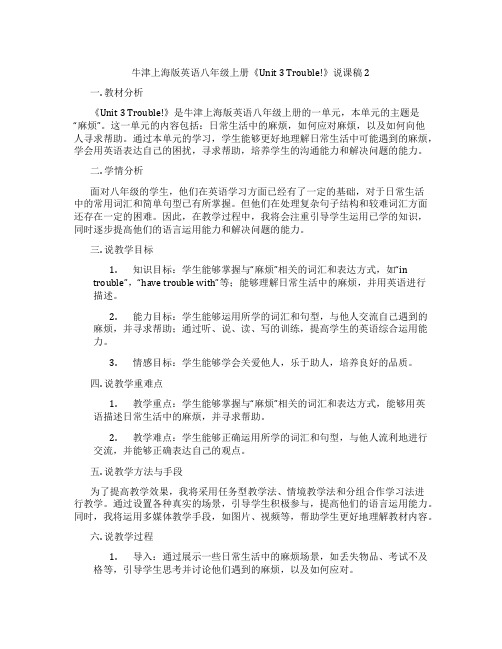
牛津上海版英语八年级上册《Unit 3 Trouble!》说课稿2一. 教材分析《Unit 3 Trouble!》是牛津上海版英语八年级上册的一单元,本单元的主题是“麻烦”。
这一单元的内容包括:日常生活中的麻烦,如何应对麻烦,以及如何向他人寻求帮助。
通过本单元的学习,学生能够更好地理解日常生活中可能遇到的麻烦,学会用英语表达自己的困扰,寻求帮助,培养学生的沟通能力和解决问题的能力。
二. 学情分析面对八年级的学生,他们在英语学习方面已经有了一定的基础,对于日常生活中的常用词汇和简单句型已有所掌握。
但他们在处理复杂句子结构和较难词汇方面还存在一定的困难。
因此,在教学过程中,我将会注重引导学生运用已学的知识,同时逐步提高他们的语言运用能力和解决问题的能力。
三. 说教学目标1.知识目标:学生能够掌握与“麻烦”相关的词汇和表达方式,如“introuble”,“have trouble with”等;能够理解日常生活中的麻烦,并用英语进行描述。
2.能力目标:学生能够运用所学的词汇和句型,与他人交流自己遇到的麻烦,并寻求帮助;通过听、说、读、写的训练,提高学生的英语综合运用能力。
3.情感目标:学生能够学会关爱他人,乐于助人,培养良好的品质。
四. 说教学重难点1.教学重点:学生能够掌握与“麻烦”相关的词汇和表达方式,能够用英语描述日常生活中的麻烦,并寻求帮助。
2.教学难点:学生能够正确运用所学的词汇和句型,与他人流利地进行交流,并能够正确表达自己的观点。
五. 说教学方法与手段为了提高教学效果,我将采用任务型教学法、情境教学法和分组合作学习法进行教学。
通过设置各种真实的场景,引导学生积极参与,提高他们的语言运用能力。
同时,我将运用多媒体教学手段,如图片、视频等,帮助学生更好地理解教材内容。
六. 说教学过程1.导入:通过展示一些日常生活中的麻烦场景,如丢失物品、考试不及格等,引导学生思考并讨论他们遇到的麻烦,以及如何应对。
沪教牛津版英语上册八年级全册教案-沪教牛津版8年级英语上册
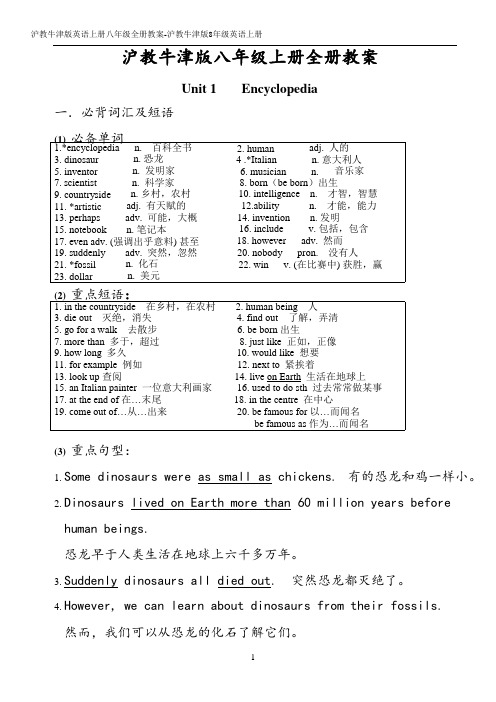
20. nobody pron. 没有人 22. win v. (在比赛中) 获胜,赢 adv. 突然,忽然 n. 化石 n. 美元 19. suddenly21. *fossil23. dollar10. intelligence n. 才智,智慧 12.ability n. 才能,能力 14. invention n. 发明 16. include v. 包括,包含 18. however adv. 然而 17. even adv. (强调出乎意料) 甚至8. born (be born )出生 音乐家 n. adj. 人的 n. 意大利人 2. human 4 .*Italian 6. musician n. 百科全书n. 恐龙 n. 发明家 n. 科学家 n. 乡村,农村 adj. 有天赋的 adv. 可能,大概 n. 笔记本 1.*encyclopedia 3. dinosaur5. inventor7. scientist9. countryside11. *artistic13. perhaps15. notebook沪教牛津版八年级上册全册教案Unit 1Encyclopedia 一.必背词汇及短语(1) 必备单词(3) 重点句型:1. Some dinosaurs were as small as chickens. 有的恐龙和鸡一样小。
2. Dinosaurs lived on Earth more than 60 million years before human beings.恐龙早于人类生活在地球上六千多万年。
3. Suddenly dinosaurs all died out. 突然恐龙都灭绝了。
4. However, we can learn about dinosaurs from their fossils. 然而,我们可以从恐龙的化石了解它们。
5.Nobody knows why. 没有人知道其中的原因。
- 1、下载文档前请自行甄别文档内容的完整性,平台不提供额外的编辑、内容补充、找答案等附加服务。
- 2、"仅部分预览"的文档,不可在线预览部分如存在完整性等问题,可反馈申请退款(可完整预览的文档不适用该条件!)。
- 3、如文档侵犯您的权益,请联系客服反馈,我们会尽快为您处理(人工客服工作时间:9:00-18:30)。
Units 1&2一、重点、难点归纳1.情态动词:should; ought to+动原You ought not to do it.He ought to go now, oughtn’t he?Ought I to go? Yes, you ought (to).2.动词不定式(to do)和动名词(doing)(1)动词后面只接带to的不定式的有:hope, want, would like, wish, agree, promise, decide, manage, happen, offer, plan, ask, tell, order…(2)动词后面只接不带to的不定式(即原形):使役动词:let, have, make短语:had better(3)动词后面只接动名词(doing):enjoy, practice, finish, mind, keep, suggest, have fun, look forward to, feel like, give up…二、重点句式1.make sb. do sth. 让/使某人做某事make sb./sth. +adj. 使某人/物……He made his brother repair the toy for him.We should do our best to make our country stronger and more beautiful.2.appear to do sth. 似乎要……He appears to have a lot of money.3.If possible, I’d like to have one more section about school life in foreign countries.if possible = if it is possibleI’d like to do = I would like to do 我想三、话题1,认知和了解校报,并对校报的设计发表自己的看法。
2,了解有关侦探和犯罪的话题,并能报告犯罪事实。
过关检测一、词汇1.Soon after the t__________ started, some Grade Eight students wanted to publish anewspaper.2.Should the newspaper be free for readers, or should they p__________ for it?3. A helicopter flew over us and took a photo from the a__________.4.You are very interested in fashion. Why not study d_________ when you leave school?5.During the b___________ of the class, Jia Ming ran to the sports field to play football withhis classmates.6.I wasn’t sure. I needed proof. I c__________ her story. It was true.7.“Was the cinema full or e__________?” Ken asked.8.There would be a good film on this evening, so I called her to i____________ her to thecinema.9.How much is the ________ for the film tonight?10.I saw a man ___________ a bank in the city centre with a gun yesterday.二、短语try ones’ best pay for be free for not at all get on well with be angry withsay good night to no longer instead of the same as1. He had to ________________________ the broken window.2. All the parks in Guangzhou now ________________________ the people.3. Anyway, we should ________________________ the people around us.4. I am used to ________________________ my parents before I go to bed.5. If you ________________________, I’m sure you can get what you want.6. He moved to Canada, so he ________________________ lives here.7. I wanted to the hospital as quickly as possible, so I took a taxi ________________________ a bus.8. My mother gave me some advice on fashion, but I ________________________agree with her ________________________.9. I ________________________ him for keeping me waiting so long.10. I noticed Jill’s necklace had ________________________design ________________________the earring.三、句式A.请按要求作相应的句型转换。
1.He ought to say that.(改为否定句)2.She ought not to take other’s letter.(划线提问)3.Should students wear school uniforms at school?(根据你的见解作出回答)4.Children should speak politely to the old.(变为反意疑问句)5.I always try to trouble others.(用不定式的否定式改写句子)6.We decided that we would go out for dinner.(改为简单句)7.should, as, possible, we, practice, much, as, speaking, English(连词成句)8.They both denied to steal the vase.(改错)9.He felt sick because he ate too much.(完成下列句子)He felt sick because of ________________________.B.根据所给的汉语内容,用英语完成下列句子。
1.运动场应该免费提供给人们?还是应该付费?Should the playground __________ ________ for the people__________ should they __________for it?2.新的电视塔比设计中的矮了一点。
The new TV Tower __________ __________ __________ __________than that is designed. 3.小孩学会独立很重要。
It’s very __________ __________ a child __________ __________to be independent.4.如果可能的话,我想出国读书。
__________ __________, I want to __________ __________ .5.我开始有点紧张,但很快就对自己有信心了。
I was a bit nervous __________ the beginning, __________ I __________ __________ to myself quickly.Units 3&4一、重点、难点归纳1,形容词的比较级与最高级(1)规则变化(2)不规则变化good/well --- better --- bestbad/badly --- worse --- worstmany/much --- more ---mostlittle --- less --- leastold --- older/elder --- oldest/eldestfar --- farther/further --- farthest/furthest(3)形容词比较级的基本用法A is as/(not so) …. asB “A和B一样(或不一样)”A is …. than B形容词的比较级前面可以用much, a lot, far, even, still, a little, a bit等词语来修饰。
Your brother is a little older than I.2,现在完成时(1)现在完成时用来表示说话前某一个时刻发生的动作的结果对现在的影响,常与already, just, yet等词连用。
She has just had her lunch.(2)表示从过去某一时间持续到说话为止的动作或状态,常与“for+时间段”或“since+过去的某个时间”这类时间状语连用。
They have learnt Chinese for 12 years.(3)表示从过去某一个时间到说话时这一过程中动作发生的次数的总和。
I have been to Shenzhen three times.(4)常与现在完成时连用的时间状语有:for, since, already, never, ever, recently, in the past few years, these few years, these days, up to now, so far …3,一般过去时动词要用过去时态。
